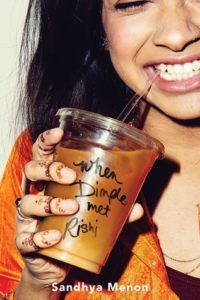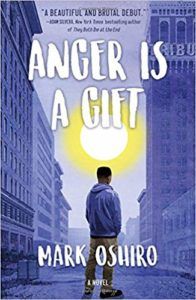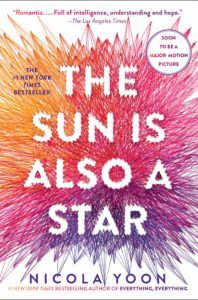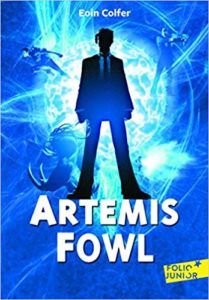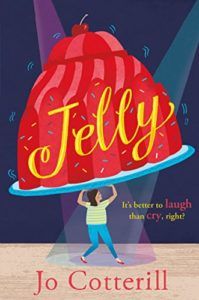Thom from Hero by Perry Moore
Thom, the son of a disgraced former superhero, begins the story hiding two aspects of his identity from his dad. He’s gay, and his dad’s homophobic; he also has superpowers, and his father, who was more in the Batman vein of superheroism, despises powered heroes. The nature of Thom’s powers are a particularly interesting choice when it comes to superpowers given to male heroes. Thom is able to heal people, a power far more commonly given to female characters (from 70s fantasy straight through to Disney’s Tangled). As well as being able to medically care for and nurture the people around him, Thom offers plenty of emotional support to the other trainee superheroes on his team.
Rishi from When Dimple Met Rishi by Sandhya Menon
I adored both of the lead characters in this sweet, funny teen romcom, but I must admit that I have a particular soft spot for lovestruck Rishi, who’s adorkably enthusiastic about his prospective marriage to heroine Dimple. While Rishi initially sets out to try to impress Dimple and make her as eager to marry him as he is to marry her, he takes her feelings and her greater reluctance completely on board, and quickly switches to supporting her while she tries to achieve her dream of winning a coding competition and meeting her role model. Rishi also learns how to be more sensitive to his own interests, and with Dimple’s help and support, begins to nurture his own dream of becoming an artist.
Moss from Anger is a Gift by Mark Oshiro
‘Enthusiastic nerd’ and loyal, compassionate protagonist Moss is the emotional rock for many people in his life, from his bereaved mother to his extensive friendship group. Unlike many male protagonists, Moss isn’t written as stoic or strong-and-silent – instead, the anxiety he lives with is a central part of his character, brought to the fore throughout the story. Moss’s story teaches young male readers that mental illness is something they can experience and are allowed to talk about – an important lesson when we consider the high suicide rates across many young male demographics.
Briar from The Circle of Magic Series by Tamora Pierce
Despite being another magical healer, Briar Moss doesn’t initially seem to fit the mould of a ‘sensitive boy’ – he’s a hardened ex-thief who had to be tough to survive his life on the streets. However, as Briar’s story unfolds, we realise that being tough doesn’t mean you can’t also be sensitive, and find your real passion in areas that aren’t traditionally coded as masculine. Briar’s magic is focused around plants and flowers, and he can communicate with them, picking up on their experiences and even their emotions. This empathy extends not only to plants, but to the people around him; Briar is a caring and supportive brother to his new adoptive sisters, without trying to play the ‘scary older brother’ to any of their romantic prospects. Unusually for a male hero, his mentor and role model in life is a woman, the sharp, crotchety, but secretly kind Rosethorn.
Daniel in The Sun is Also a Star by Nicola Yoon
Daniel Bae is a poet with a romantic heart, whose relationship with the highly logical and science-focused Natasha begins in a way that perfectly combines their two very different personalities. They both ask and answer a series of questions designed by a scientific study to see if it’s possible to make two people fall in love at (almost) first sight. Daniel believes firmly in love and the power of human connection, and despite the upheaval that takes place in both characters’ lives during the course of the story, readers can’t help but come away agreeing with him a little.
Artemis from the Artemis Fowl series by Eoin Colfer
Now, hear me out. I know Artemis is a villain (at least, to begin with). I know he’s also an evil supergenius who has no qualms about potentially upturning all of Fairy society. But in spite of this, Artemis is surprisingly sensitive. He’s motivated almost completely by his attempts to hold his family together, and, later, by a wish to save the environment and reduce some of the harm that humanity is causing to the natural world.
Special Mention: Lennon from Jelly by Jo Cotterill
Lennon is a grown man and a secondary character, but he deserves a mention nonetheless for being one of the most positive representations of a father figure in middle-grade literature that I’ve read in recent years. New boyfriend to protagonist Jelly’s mum, Lennon is the only person to realise that the outgoing, joke-cracking Jelly is actually a lot more shy and sensitive than she seems to be. He also scores an A+ in helping Jelly deal with her first period without making it awkward or uncomfortable for either of them. For more representation that boy readers may need, have a look at 13 Awesome YA Books with Bisexual Boys. And of course, books don’t have to have a male protagonist for boys to read them, as discussed in “Where Are All The Boy Books?” You’re Buying Them.

